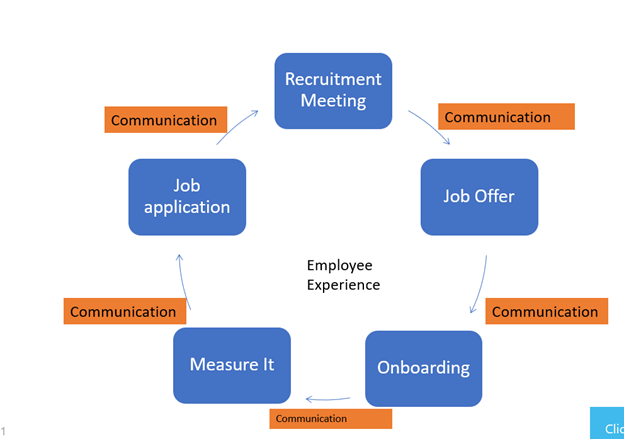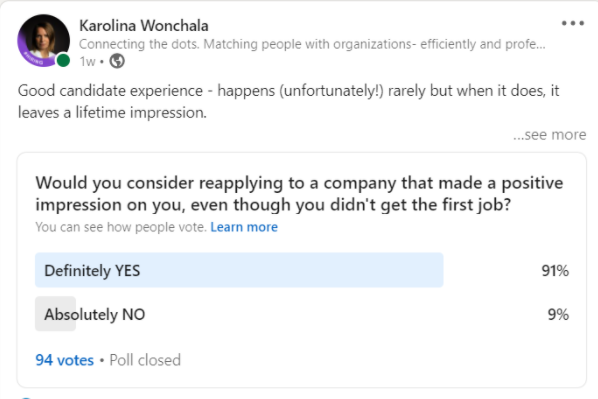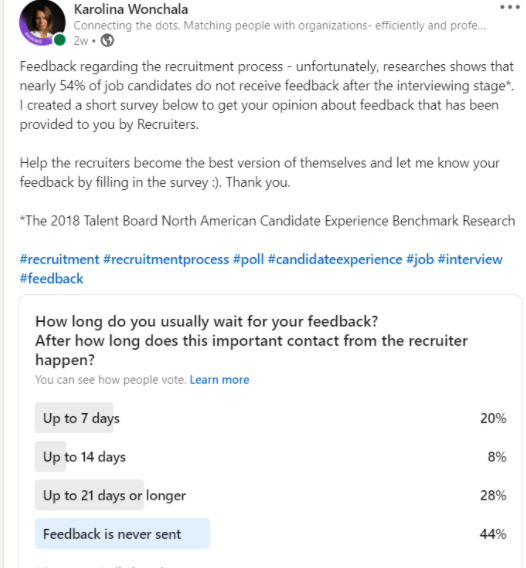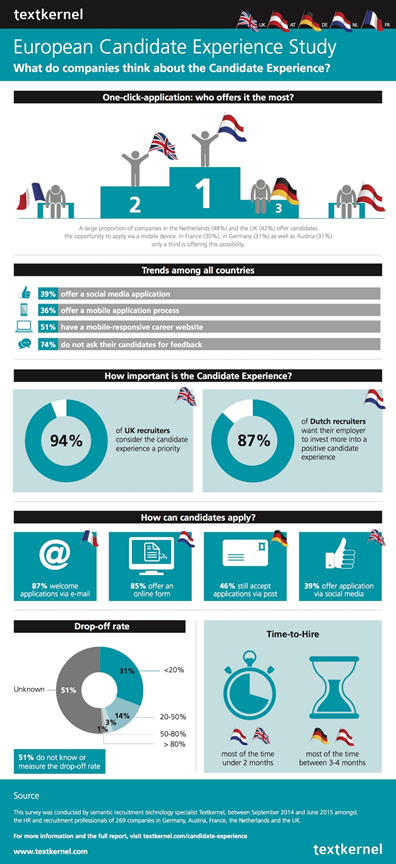
Is this another HR fad, or rather the term that should be at the top of your agenda in 2021? We would like to explain what Candidate Experience actually means, how your company can benefit from it and how you can easily measure it. Let’s get started…
What does candidate experience mean?
Undoubtedly, the feelings should be positive and make the candidate think well of your company. It starts from the moment they see your job advert, fill in the application form, get contacted by the recruiter, go through the whole recruitment process, receive the job offer and – last but not least – get accepted into your company.
Take a look at our Candidate Experience Cycle and see what the key elements are to building a great candidate experience.

Why candidate experience matters?
You want your candidates to feel good about your company. A positive perception of the company will get them more involved in the recruitment process, influences their decision-making process, positively impacts job acceptance rates, and leads to new candidates, as happy and satisfied candidates tend to refer their colleagues and friends to the new employer. According to a recent Candidate Experience report from Erecruiter, happy candidates are also better customers who choose your products – if their experience during the hiring process was positive. This doesn’t necessarily mean you have to hire them, but they should be treated with respect, given timely feedback, and communicated with at every stage of the process.
Good candidate experience also has a positive impact on retention rates and overall satisfaction of new hires and subsequent employees.
Why candidate experience matters?
Looking at the recent Karolina’s Wonchała Linkedin survey results, we can see that if candidates are treated well, they would apply again to the same company if an interesting opportunity came up, even if they didn’t get the job the first time they applied.

The survey also says that candidates rarely receive feedback after the hiring process. 44% of respondents say feedback is never sent. However, another half say feedback is usually sent within the first three weeks.

We can see that there is room for improvement in this area, but more and more companies are aware of the importance of a good employee experience and are trying different approaches to positively surprise candidates in the hiring process. For more information below, read on.
Candidate experience in Poland
According to Erecruiter’s 2019 report on Candidate Experience, the situation in this field has changed significantly in recent years, and companies are trying their best to take care of candidates and provide a good candidate experience.
- More candidates are stating that organisations are more often focusing on providing a positive candidate experience.
- One of the main reasons for companies to implement best practises in recruiting is to provide a good candidate experience
- Candidates expect companies to provide honest and truthful information about job requirements and the work environment.
- More than half of the candidates surveyed want to know the reason for rejection in the hiring process.
The more good practices in this area, the better outcomes for organisations. Candidates see the improvement in the way the recruitment processes are conducted, which may lead to greater number of applications and lower offer rejection rates. Feedback, at the end of the process, plays an important role in the whole recruitment experience not only for candidates but also for recruiters.
Candidate experience in five European Countries
According to the study prepared by Textkernel “European Candidate Experience”, best practice in this area is most widespread in the Netherlands, offering candidates possibility to apply via a mobile device.
Positive applicant experience activities in recruitment activities are also high on the agenda of UK recruiters. The system they use should ensure a simple and straightforward application process, and time to hire is usually under 2 months in aformentioned countries.
To see what organisations from other European countries are doing to ensure the best possible candidate experience, check out the infographic below:

We can see that in Poland the great Candidate Experience encompasses the attitude towards candidates, giving them truthful information about the tasks and duties, being in contact with them and informing them about the recruitment process. While in the above European countries the focus shifts towards technology and tools that make the recruitment process easier and friendlier.
How to provide good candidate experience
It is probably very expensive – you would say, and only large organisations can afford it – but nothing could be further from the truth.
Things that matter and allow you to provide a great experience for your candidates, things that turn candidates into your brand ambassadors who speak positively about you in Social Media – don’t have to cost you a lot. Start with simple steps and it will pay off:
- Have a candidate experience strategy in place, make it an important driver of recruitment practices within your organisation
- Make the application process simple and fast – directly from Linkedin Profile or through an integrated application form that easily pulls together all the information from CV candidates. Make your systems compatible with both desktop and mobile devices.
- Ensure recruiters are not overloaded with their tasks and have time to give each candidate the attention they need. They are experts at what they do, they know how to conduct structured interviews, and they get all the information they need during the initial screening call.
- Candidates get all the information they need during the hiring process and get feedback after each milestone of the recruitment journey.
- Be engaged and enthousiastic when offering the candidate the job, let them feel special and let them know that they will be a valued member of the team.
- Stay connected between the time the offer was accepted and the candidates’ first day at your company – this is where things tend to complicate as candidates get tempted by the current employers with counter offers or by other recruiters.
- Build a great candidate onboarding process, engaging team members and the team leader, not forgetting about the welcome pack and all necessary accesses that should be ready for their first day at work.
- Give candidates insightful feedback if the process doesn’t end positively for them. Recruiters tend to focus on successful candidates and leave those who aren’t so lucky until the very end or simply forget about them. However, information about how candidates can improve, what they can do differently in the future to be more successful, is critical to building a positive candidate experience. Prepare detailed information for them, and let them take this gift away.
How to measure candidate experience
The best way to measure the candidate experience is to ask them how they feel about the hiring process – it’s that simple. The best way to do this is to create a candidate experience survey that can be sent to candidates after a recruitment process is complete. Another way, which also allows us to examine the way we conduct recruiting and onboarding processes, is to create a New Joiner Survey that covers the entire process – from the application phase to the first four weeks at the company.
When to send candidate experience survey
If you’re wondering how to check that you’re doing everything you can to positively surprise your candidates, that you’re providing them with enough information, and that they’re simply impressed with the way your company cares about them – send them a candidate experience survey. Some companies send them to every candidate, others only to the successful ones – which doesn’t necessarily tell you where there is room for improvement and what you can do to get better at creating a great candidate experience.
The best time to send out a candidate experience survey is right after the offer has been accepted – in the case of successful candidates. In case of rejected candidates, we would suggest to send it a few days after they’ve been notified of your decision and were provided with the feedback.
Some employers send the survey after the onboarding process is complete to evaluate this stage of the recruitment process as well, as it is critical to new employee engagement and greatly impacts subsequent retention rates.
Candidate experience and retention
A positive candidate experience not only allows you to hire employees who will hold similar values and who will contribute to the company’s success – it also leads to better employee retention and helps you reduce hiring costs in the long run.
So, as we can see, a positive Candidate Experience can provide a win-win situation where candidates feel fulfilled because they are treated well and respected during their hiring journey, and the employer wins by attracting candidates who potentially become their customers, brand ambassadors, and engaged employees. If you’re interested in how to check whether you are doing it right, watch this space as we plan to have something ready for you soon.
Sources:
https://www.textkernel.com/newsroom/state-of-the-candidate-experience-in-5-european-countries/
http://fnope.org.pl/dokumenty/2019/11/Candidate_Experience_w_Polsce_2019.pdf
Let’s start
cooperating
Send us a message whether you are thinking of a career change, looking for exceptional talent or just would like to meet for a coffee and chat.
Related Posts
How to Choose the Best IT Recruiting Firm: Key Success Factors for 2024
In 2024, the IT industry is no longer a bidding paradise, but the demand for…
Women in Tech Statistics in 2024: Trends, Gaps, and Challenges
The tech industry is evolving, with recent data shedding light on the role of women…
Challenges in recruiting Women for Tech roles
Recruiting women, particularly in certain industries and roles, presents a unique set of challenges. These…
Empowering Women in Tech: Key Initiatives in Poland
The tech industry in Poland is witnessing a dynamic shift towards inclusivity and diversity, driven…



